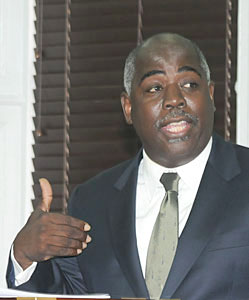
Philip “Brave” Davis
Remarks House of Assembly
Wednesday, October 12, 2011
Mr. Speaker, Members of Parliament, fellow Bahamians:
We are here today to discuss not just an important issue but the most important issue facing The Bahamas. A government’s first responsibility is to protect its citizens, and after four of the most violent years in our nation’s history, it is clear to all that this responsibility has not been met.
Keeping people safe is not a small thing – on the contrary, it is everything. We cannot do great things as a nation, we cannot look to a prosperous future, if our homes and streets are not safe.
We must win the war against violence. The alternative is unimaginable.
The Progressive Liberal Party has a record of creating pioneering, award-winning, internationally recognized programmes to fight crime. Unfortunately, when they took office, the current government put politics first, not Bahamians, and they cut funding for the PLP’s Urban Renewal and Swift Justice programmes.
Four years later, nothing has been learned — The Prime Minister’s Crime Bills were DOA – disappointing on arrival.
Yes, there are a handful of reasonable proposals which the PLP is happy to support – we’re always looking for common ground on this key issue.
But on the whole, Bahamians agree, these Crime Bills are much too little, much too late. Once again, the government has decided to massively underinvest in the prevention of crime, and once again, the government has failed to implement Swift Justice or offer an alternative plan to reduce the time between arrest and trial.
These Crime Bills are the answer to the wrong question. The question the FNM clearly asked themselves was: what do we do about the political problem we have because of our obvious failure to fight crime? What the FNM should have asked themselves is: what are the most effective measures to prevent, prosecute and punish crime?
Mr. Speaker, these Crime Bills fall far short on many fronts, but on one particular front most egregiously – they fail to sufficiently invest in people. This is a pattern with the FNM – they can handle things, but not people. Can the FNM build a road? Sure they can….it will cost too much, too many foreigners will be hired, they’ll fail to consult local businesses and residents…but at the end you’ll have a road. But what the FNM has time and again failed to do is to properly invest in the people of The Bahamas, and unfortunately, these Crime Bills make the same mistake once again.
At a time when the economy is in trouble, at a time when too many families are struggling, at a time when thousands were turned away from a jobs program, the Prime Minister offers only $1 million in new funding for social intervention.
To put that $1 million in perspective, the government spent $5 million more on Miss Universe! Indeed, this government has routinely spent millions on lawyers and fees for delaying or cancelling PLP projects simply because they were initiated by the PLP.
So the $1 million is clearly too little. And after a summer in which 30 people were murdered, it’s clearly too late, too. During the last election, the Prime Minister made crime a political issue – but when he took office, he dumped the issue, and has failed to provide any leadership on crime ever since. Now he’s back with his Crime Bills – but it’s much too little, much too late.
The Bahamas needs vigorous, engaged leadership on crime all the time, not just during election time.
Mr. Speaker, in a moment I’m going to address some of the issues raised in the Crime Bills, but first I’m going to talk about Project Safe Bahamas.
Project Safe Bahamas, a comprehensive plan to fight crime and reduce violence, was introduced over the summer by the Rt. Hon. Perry Gladstone Christie, the Leader of the Progressive Liberal Party, in an address to the nation.
Project Safe Bahamas calls for increased defence force patrols, because we must do a better job reducing illegal immigration and reducing the guns and drugs coming into our nation.
We are calling for increased gun interdiction in our ports, specialized Strike Force police teams to deal with violence, and increased surveillance for those out on bail.
And, yes, we will bring back Urban Renewal – we’re calling it Urban Renewal 2.0, because it will be even stronger. Everywhere I go in The Bahamas, people talk to me about bringing back Urban Renewal – that’s something both the FNM and the DNA fail to understand; this programme has the support of the people of The Bahamas and it must be fully funded and implemented.
The PLP’s Urban Renewal 2.0 will cut through red tape and address street-level problems troubling our communities; provide grants for community improvements, empowering residents and civic leaders; introduce a new mentoring program with successful Bahamians from tough backgrounds building relationships with at-risk youth; increase support for faith-based initiatives; strengthen after-school programs, and more.
Mr. Speaker, it’s time to face facts: there are too few education and training and job opportunities for our youth, and too many opportunities to go astray. For some young people, it’s easier to get access to guns or drugs than it is for them to find access to a caring, trusted adult. The PLP believes that we cannot fight crime unless we change this equation.
We must identify the most vulnerable young people and give them a chance. We must, or we will lose an entire generation. We must, or we will lose everything that is important.
The PLP’s Project Safe Bahamas will provide mentoring and opportunities and tough love. Law enforcement is only one piece of the puzzle — we are going to involve everyone in our effort – community leaders and residents, clergy, business leaders, and a new group of outreach workers, called Violence Breakers, who will receive intensive training in conflict mediation. These street-smart individuals will be trained to intervene directly in the cycle of retaliatory killings.
Minister Turnquest is famous for dismissing the crime problem as merely “criminals killing other criminals” – as if these people did not come from devastated families, as if they did not live in our neighborhoods, as if their violence didn’t have a ripple effect, as if living in a nation with murder on the streets and in the headlines every day did not affect our children.
Let me be clear: this government’s Crime Bills reflect this FNM “who cares?” attitude and do virtually nothing to address revenge killings directly.
We strenuously disagree, Mr. Speaker, with the idea that this kind of violence is inevitable in The Bahamas.
We must use every available resource to give young people a chance.
That’s why the Progressive Liberal Party believes efforts to fight crime must go hand-in-hand with a vision to create jobs and expand the economy. The PLP created 22,000 jobs during our last term, even outpacing the US economy in growth. We did it before and we’re preparing to do it again: at a recent Job Creation Summit in South West New Providence, we shared dozens of new proposals to create jobs and expand the economy, empowering Bahamians and increasing ownership opportunities. We are planning to double the nation’s investment in education and training, so that all Bahamians have the skills they need to compete in the 21st century.
We believe in Bahamians, Mr. Speaker. And we believe it’s time for The Bahamas to have a government that is ready to invest in its people.
So it’s fair to say we have a fundamental difference with the FNM and the DNA – we believe in robust prevention efforts, the FNM has offered a pathetic amount of funding for non-specified social intervention, and the DNA’s so-called “crime plan” is completely silent on prevention.
The PLP’s Project Safe Bahamas is a holistic approach – prevention, prosecution, punishment, and rehabilitation.
In contrast, this government’s Crime Bills are woefully inadequate.
Mr. Speaker:
Exposes the folly of our system. A system that focuses primarily on maintaining public order and punishment that views crime only as an offence against the government not an injury to victim or community.
– Victims are not repaid offenders not call upon to make things right
– Community not taking responsibility to see justice done
It cries out for the need for a whole new philosophy a radical new approach to crime, victim and communities – project Safe Bahamas does just this.
Even if true the Bahamas need a government that focuses on fighting crime all the time not just at election time.
CPC Amendments
13 Amendments are proposed.
Section 7 of the principal act is amended to increase the sentencing power, of the magistrate with respect to hybrid offences. At present the magistrate can sentence a person convicted of such offence to a maximum of 5 years – this is now being increased to 7 years.
The circumstances under which this sentencing jurisdiction will apply is where a person is charged with an offence that could be tried by a magistrate (a single judge) or the Supreme Court (trial by jury) at the instance of the person charge – the accused has to consent to being tried by the magistrate. If such person consents to be tried by a magistrate upon this Amendment coming into force (law) he will be liable to be sentenced to 7 years in prison.
I share a caution observation.
It has been held there is a right to be tried by jury and this right is characterised by the seriousness of the offence which is connected to the severity of the punishment to which the accused is exposed. Consequently, we are prohibited by the Supreme law of the land, the Constitution, from conferring sentencing powers on a magistrate that could deem to be to severe.
We should be reminded that there was a judicial view that 5 years was the upper limits of the sentencing powers of a magistrate and any attempt to increase this would be offensive to our Constitution. The concept that the sentencing powers of the magistrate is limited, though accepted on appeal against this decision, set aside that the outer limit was 5 years which was later confirm by the Privy Council, however declined as did the Court of Appeal to fix an outer limit. Could it be said conferring 7 years on magistrate court will offend the right to be tried by jury. I trust that consideration was had on this issue.
Section 9
Is akin to a consequential amendment to the powers of sentencing by a magistrate and my remarks about sentencing powers will apply equal to this amendment. It deals with convictions, for more than one offence and the maximum in the aggregate of the terms of consecutive sentences of imprisonment.
Section 19
It is important to understand the effect of this amendment. Objects and reasons state that it is to enlarge the further period for which a person may be held where investigations are incomplete from 48 hours (2) to 72 hours (3). At first blush it would appear that a person in custody for matters still under investigations could be held for 5 days without being charged.
To put in perspective, Section 18 of Criminal Procedure Code empowers the police to hold a person in custody for 48 hours (2 days) before taking or sending him before a magistrate.
The police is required, without unnecessary delay, to take a person arrested before a magistrate and not later than 48 hours. Section 19 was introduced in 2000. This section made provision for police officers to make an ex parte to a magistrate for a further period not exceeding 48 hours – this is now being amended to 72 hours i.e.
48 & 72 = 120 hours = 5 days. I am troubled by this. A person arrested not charged and would have been held in police custody for 5 days, sanctioned by the courts on an ex parte hearing. If we intend to deprive a person of his liberty in such case, at least he should be given a hearing before the magistrate to show cause why he should no longer be held in custody – it should not be just the police making representations to the magistrate.
Section 120
Firearms licensing officer could give a report in connection with a firearm instead of appearing in court.
Section 170
The abolition of the use of the unsworn statement from the dock in the court of the Bahamas is significant. It has been a feature in the criminal courts from time immemorial. Most commonwealth jurisdictions have abolish this feature.
Clause 173
Empowering the courts to draw adverse inference from an accused failure to comply with alibi notice – is and will be fraught with difficulties – It lends itself to a spectre of unfairness.
Section 176
Prosecution has last say.
Section 185
Victims can now participate in sentencing proceedings if their choosing as opposed to leaving to discretion of judge.
Section 213
Hybrid offences no longer have statutory limits to be instituted.
Section 235
Makes provision for counsel of party to an order to be served – Notice of Appeal.
Section 258
Alibi Notice to be given at time of voluntary bill being presented to magistrate – brings in line with the traditional preliminary inquiry.
Bail Act
Until our system is fixed however we tweak the bail act will not prevent the grant of bail to persons charged with serious offences. The only answer to this vexing question is to be able to try persons within a reasonable time. That’s the long and short of it.
The attempt to define reasonable time is an admission of our failure or inability to fix the system.
Instead of attempting to define “reasonable time” – we should be promoting initiatives to fix the system – initiatives like swift justice.
“Reasonable time” phrase is contained in the Constitution and it is not defined therein nor does it contain a provision to permit a definition to be enacted by Parliament. This surely raises a question as whether it is permissible for us to so define the phrase – and I trust that has been considered.
You see in determining whether a person should be admitted to bail the court is being obliged to take into account, amongst other things, whether the person charged has not been tried within a reasonable time (past tense) or is unlikely to be tried within reasonable time (futuristic).
It is proposed that 3 years shall be deemed a reasonable time – if a person is not tried within 3 years, in other words, it will not be considered unreasonable – As said this relies on the admission of failure to fix the system – the point here though is that a person charged has to be in prison for 3 years before being able to satisfy a judge that he is unable to be tried within a reasonable time. Or put another way, what if a person charged is able to demonstrate to a judge at any time within 3 years of his arrest that he is unable to be tried within the 3 years could the judge not admit that person to bail? Reconciling these two factors – past and future – is difficult. Is it that no application could be made until 3 years of incarnation has elapsed?
Lets fix the system!!
Lets effectively employ swift justice. This is our answer.
It is believe that many persons on bail continues with a life of crime – if truth be told there are hundreds of young men on bail wondering aimlessly and dejectedly in our communities because they are unable to find anything to do – even in good economic times – employers shy away or are reluctant to hire persons on bail and perhaps justifiably so.
But an answer has to be found to put these idle hands to work – legitimate work, that is task of a government and one must be found
Penal Code
Amendment seeks to set out the circumstances that will attract the death penalty and to define life imprisonment.
Those circumstances could be singularly sum up to victims who are in or connect to the administration of justice on the one hand or murder committed in the course of a felony or multiple murders on the other hand.
The concern here is the attempt to define life imprisonment. Have much consideration been given to this? There is jurisprudence to suggest natural life without an opportunity to review with a view of release is cruel and unusual punishment.
And further have the cost of housing a convict for his natural life being considered.
And further yet is this position inform by any study or just another knee jerk reaction to our crisis.
Life expectancy of our males today is 70 years. Lets say the average age of persons being sentenced is 30 years. That person is the responsibility of the state for 40 years. It costs taxpayers $14,000 per annum to house a prisoner today – do the math – there are at least – 400 persons to be tried – millions of dollars it will be costing the taxpayers. It surely would have been helpful if some study on the recidivism rate of persons who say may have served 20 or more years in prison. Would this not have been a useful guide to inform the legislative process.
I am prepared to suggest that you will find that 20 years in prison will not have a recidivism rate – Note you will find back in our prisons.
In respect to capital punishment – we must be clear – Laws made by us are subject to the Rule of Law (D.B. referred) sentencing is the province of the courts and the execution of the sentence pass by the courts is to be executed by the executive.
Government do not sentence, it carries out the sentence. The listed circumstances that would attract the death penalty is just that – the fact that it attracts the death penalty does not mean that inevitable the sentence of death will be handed down.
Lets be clear about that:
– What we have here is not sentencing guidelines but rather a list of circumstances attracting consideration for the death penalty to be handed down;
– Degrees of moral guilt/public danger – vary no reasonable prospect of a reformation and therein lies the roadblock. There is prevailing jurisprudence of the redemptive spirit of man.
Amendment to Court of Appeal Act
Did not wish to comment on this amendment as I thought that the member of North Abaco correctly and ably stated in his communication the effect and consequence of this amendment and the present position as obtain today – The member from Carmichael in his contributions has caused some confusion – to clear it up can’t do any better than to repeat what he said ( read).
Mr. Speaker, the PLP is the only party in The Bahamas with a comprehensive and innovative plan to fight crime and reduce violence. The PLP is the only party with dozens of new ideas to create jobs and expand the economy. The PLP is the only party which will double the nation’s investment in education and training. The PLP is the party that believes in Bahamians







